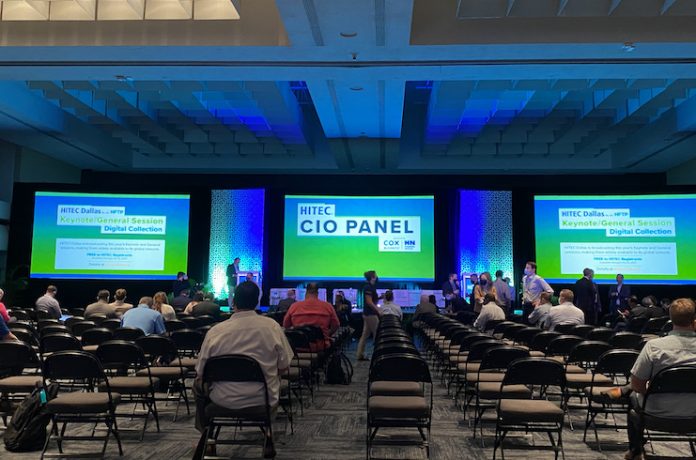On the second day of HITEC Dallas 2021 at the Kay Bailey Hutchinson Convention Center in Dallas, Texas, two industry leaders were inducted into the Hospitality Technology Hall of Fame: Raman (R.P.) Rama, president and CTO/CIO of Sarona Hotels, Investments & Premier Management Services, and Mark G. Haley, co-founder and partner of Prism Hospitality Consulting, LLC. Frank Wolfe, CEO of HFTP, announced the inductees.
In addition to naming Rama and Haley to the Hospitality Technology Hall of Fame, John Burns, president of Hospitality Technology Consulting, led a panel discussion with chief information officers from a variety of hospitality companies spanning several segments. Starting the panel, both Scott Strickland from Wyndham Hotels & Resorts and Dan Kornick from Loews Hotel & Co. cited that each company had to cut back on labor through the pandemic. But Michael Levie from citizenM said that although the industry was hit hard by the COVID-19 pandemic, citizenM prioritized a shift to digital. Levie noted, “Everybody understood that this was an incredible opportunity with almost empty hotels to finally work on our technology. And in that priority and with all the digital that needed to be implemented, we actually increased our staff. Not only did we increase our staff in the tech department, we also saw the efficiency in how many tech companies work.”
The hotel industry is bouncing back from the pandemic’s ramifications, and hoteliers are working toward retaining the employees that remain. The panel agreed that feeling valued and appreciated is key. Andrew Arthurs from Aimbridge Hospitality said, “It’s a war for talent out there. And for us at Aimbridge, it’s about the employee value proposition, and to me, that’s the intersection between extrinsic and intrinsic motivation, which really means from a compensation standpoint, we need to be very competitive. We also need to provide other motivating factors for our team so that they enjoy being part of Aimbridge, and in our case, it’s a purpose, it’s a sense of belonging, it’s a sense of membership, and it’s a sense of being part of something bigger than oneself.”
One shift that makes employees feel valued and appreciated is the option or ability to work from home. Mohammad Al Qassim from The Manor by JA noted that while working from home wasn’t ideal for the hospitality industry, it made employees think that their experience was valued and served and can help reduce attrition as a result. Al Qassim adds that organizing “extracurricular activities” for employees working from home helps to keep them engaged and incentivizes them to continue working for that company. “If you get decent interest from these employees, have decent participation, you can always find what’s missing from the virtual kind of work.”
In addition to addressing employee retention, the CIOs across the panel appreciated how technology vendors worked with the industry throughout the pandemic. Carol Beggs from Chatham Bars Inn said that it was important to “thank the vendor community because I know when we suddenly had to go remote when budgets were reduced, there were an awful lot of our vendor partners that either reduced pricing, made things free, [or] provided an awful lot of support to us as an industry when they were struggling themselves.”
An overall sentiment from HITEC Dallas 2021 is that automation will lead the future of hospitality. Guests now want the option to interact with a hotel in a variety of ways. Specifically, contactless solutions are about “guessing what the guest wants,” Kornick said. “Some like a great contactless experience. Some still want that great front desk experience. So, it’s giving them the choice to how they want to interact with us so that way we don’t have to guess.”
Although automation is a conference hot topic, not all agree that contactless specifically is what guests what. Strickland said, “We thought we were going to have more guests pull contactless than we did. We were guessing what the guest was going to want, and once we implemented some of these contactless solutions, we didn’t have the pull for the adoption that we were expecting from the guests.”
Going forward, the CIOs noted that guest expectations have shifted in the past 18 months, and the hospitality industry needs to keep up to stay relevant. Strickland added, “We were dancing around it a little bit earlier, but there’s a consumerization of IT going on right now, expectations being set in other industries that we need to step up to. So by 2024-2025, we need to be there. We need to be prepared to be there, which means we need to look at our technology stacks, we need to simplify them, we need to be agile… Second, we have to do so on the channel that they want to communicate with us on.”
As the landscape continues to shift, hoteliers must reevaluate their operations and determine what pandemic pivots are worth keeping. For instance, Kornick said, “If somebody is staying just two nights, do they need their whole room cleaned [if] they don’t want their whole room cleaned? Do they want somebody in their room at all? So, I think it’s almost more about how do you personalize some of the things that we take for granted or that we’ve been doing consistently that may not…make the guest more comfortable.”
And Levie added that in the future, hoteliers need to make educated guesses and test what works and what doesn’t work. “We need to try things and we actually need to execute them and see what happens and have that communication. And I think we learned a lot that they’re willing to adapt to change where we become more profitable because if a lot of pressure’s on our rates, our costs go up.”
[wp-video-popup autoplay=”1″ mute=”1″ video=”https://lodgingmagazine.com/wp-content/uploads/2021/09/SHO-SM-2021-September-HotelApp-1920×1080-Demo.mp4″]










